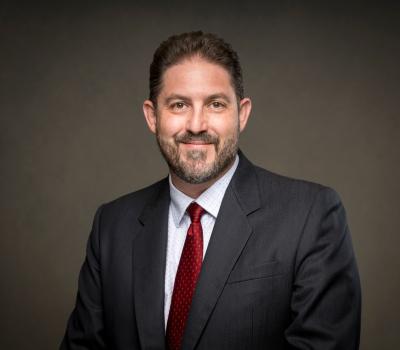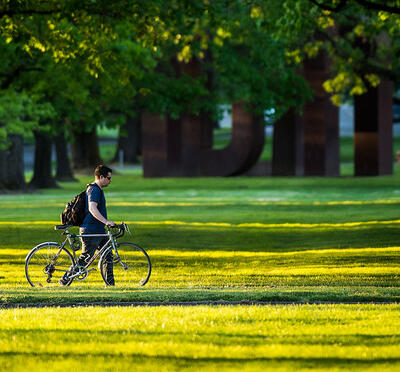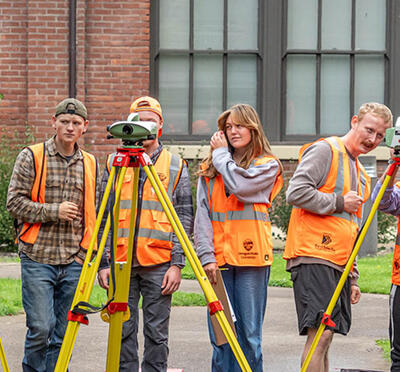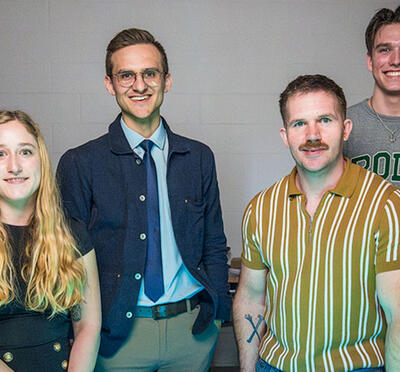Tadesse Meskele (’13 Ph.D., Civil Engineering) has always been driven to make a difference in his community. Growing up in Ethiopia, Meskele walked five miles to school and back each day, because there was no transportation, or even roads, available.
“That’s when I started dreaming about becoming an engineer,” said Meskele, the first in his extended family to attend college. “I was told that engineers build the infrastructure around us. So, in high school, I was passionate about my math, physics, and science classes. Engineering is basically problem-solving using mathematical and scientific principles.”
Today, Meskele puts his problem-solving skills to use as a project engineer at GRI, a Beaverton-based engineering firm that focuses on geotechnical, geological, pavement, and environmental projects. A self-described soil engineer, he investigates subsurface conditions at project sites to provide recommendations and design criteria for critical infrastructure such as buildings, bridges, and roads.
“My work involves performing field and laboratory evaluation of soils to understand how they behave under load and to use that information to design safer structures,” Meskele said. “There’s a huge variation in the behavior of soil even within one area — I find that very fascinating and challenging, too.”
As an undergraduate student at Arba Minch University in Ethiopia, Meskele studied civil engineering with a specific interest in geotechnical engineering. But options for graduate study in his home country were limited. And, because of Ethiopia’s recurring droughts and famine, funded opportunities abroad tend to prioritize areas such as water resources engineering. So, it was in this field that Meskele chose to earn his master’s degree — with help from a VLIR-UOS scholarship — at Katholieke Universiteit Leuven and Vrije Universiteit Brussel, both in Belgium.
After being recruited to Oregon State University by Armin Stuedlein, associate professor of geotechnical engineering, Meskele was finally able to dive into his desired specialty. His doctoral research in geotechnical engineering focused on the engineering design of pipe and culvert installations, important parts of road and highway drainage systems. Meskele worked on a technique called pipe ramming, a trenchless method that uses high-frequency hammers to place pipes in the ground, allowing projects to continue without detours or traffic delays.
Meskele earned his doctorate in just three years, publishing five refereed journal articles and four conference papers along the way. In addition, he served as an informal mentor and advisor to other graduate students, Stuedlein said.
“Overall, Tade’s trajectory — from early life, struggling to obtain an education to earning a doctorate in engineering and improving his community’s resilience to natural hazards — serves as an inspirational story and a reminder of the promise of the American dream,” he said.
Meskele’s research helped him secure his current position, working on projects that involve advanced geotechnical and seismic evaluation in the Pacific Northwest, including high-profile projects such as the Oregon State Capitol seismic upgrade and the OSU Marine Studies Initiative building in Newport, the first structure designed to withstand the combined earthquake and tsunami hazards of the Cascadia subduction zone.
“Tadesse’s efforts to develop the site-specific ground motions and address the multiple round of peer review comments were key in advancing these projects,” said Scott Schlechter, a principal engineer at GRI. “In my career, I have never met anyone with his talent and drive to complete quality designs and advance the standard of practice for geotechnical earthquake engineering.”
The Earthquake Engineering Research Institute, a leading nonprofit organization and technical society that connects those working to mitigate earthquake risks, recently recognized Meskele’s hard work and contributions to the field by selecting him as one of six Housner Fellows for 2020. As a fellow, Tadesse will conduct a group research project and receive close mentorship from EERI leaders over the course of his two-year active participation in the program.
“The Housner program gives me an exceptional opportunity to learn from leaders and other fellows with diverse professional backgrounds. The program will definitely contribute to my professional growth helping me acquire leadership skills to promote and advocate for earthquake mitigation and risk reduction in the Pacific Northwest,” Meskele said. “This is huge for me. I’m really excited.”




